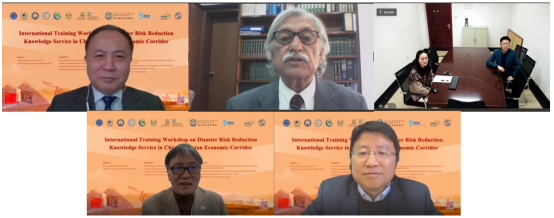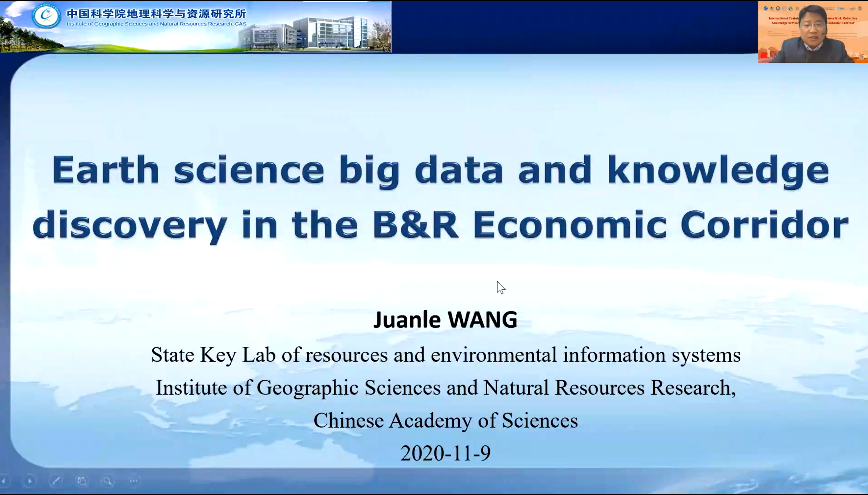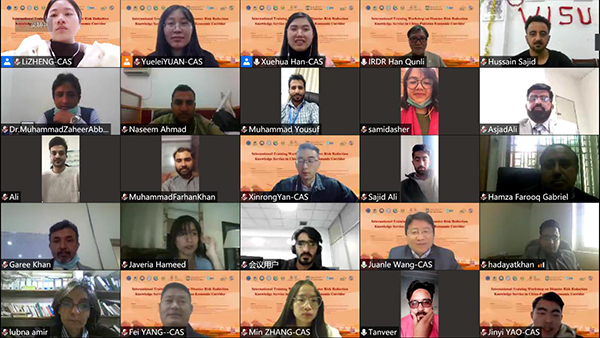International Training Workshop on Disaster Risk Reduction Knowledge Service in China-Pakistan Economic Corridor was held online through the VooV app. This training workshop was organized by the team of Disaster Risk Reduction Knowledge Service (DRRKS) of International Knowledge Centre for Engineering Sciences and Technology under the Auspices of UNESCO (IKCEST). And 179 students from 11 countries including Pakistan, China, Nepal, Sri Lanka, Indonesia, Bangladesh, Mongolia, Ethiopia, Algeria, Nigeria and Peru registered. The training workshop aims to enhance the disaster risk reduction capabilities of trainees in the CHINA-Pakistan Economic Corridor (CPEC), provide open application of a batch of basic disaster data, optimize regional data sharing and knowledge service mechanism, promote regional international cooperation in disaster risk reduction, and support the green development of CPEC.
Dr. Chang Liu, director of division of international cooperation, IKCEST, gave a report on “Current Practices of IKCEST” in the training class. Prof. Juanle Wang, executive director of DRRKS and professor of Institute of Geographic Sciences and Natural Resources Research, Chinese Academy of Sciences (IGSNRR, CAS), made reports on “Earth science big data and knowledge discovery in the Belt and Road Economic Corridor” and “Disaster Risk Reduction Knowledge Service System and its application”. Focusing on the theme of “Disaster Risk Reduction Knowledge Service”, this workshop organized 14 sessions including: “Integrated Research on Disaster Risk and development safety”, “Monitoring and Assessment of Desert Locust in Africa and Asia”, “Risk assessment of geo-hazards”, “Assessment of Heat wave risk and its impact on agricultural phenology along the Belt and Road”, “Spatiotemporal analysis of public response to COVID-19 based on social media data”, etc. Additionally, 2 questionnaires and 1 online examination were conducted.
The training workshop was organized by China-Pakistan Joint Research Center on Earth Sciences (CPJRC), Institute of Geographic Sciences and Natural Resources Research, CAS, Institute of Mountain Hazards and Environment, CAS and Department of Earth Sciences, Quaid-i-Azam University, Pakistan. It was supported by IKCEST, Integrated Research on Disaster Risk International Programme Office (IRDR IPO), Alliance of International Science Organizations (ANSO) and National Earth System Science Data Center. Dr. Qasim Jan, dean of Pakistan Academy of Sciences, Prof. Lijun Su, CPJRC, Prof. Tianhua Hong, executive director of CPJRC, Prof. Qunli Han, executive director of IRDR-IPO, and Juanle Wang attended the opening ceremony and delivered speeches.
The trainees gave feedback on the training course and questionnaire survey after the workshop. They thought that the training course was rich in content, prominent in theme and professional in explanation, which was very helpful to establish and expand the knowledge service cooperation in disaster risk reduction in the CPEC. Many trainees also expressed their willingness to cooperate in disaster information monitoring and acquisition, regional disaster risk assessment and disaster scientific data sharing. This training strengthened the exchanges and cooperation between the IKCEST DRRKS and Pakistan’s universities and scientific research institutions, expanded the network of experts and users, and laid a foundation for the application extension of knowledge service system of disaster risk reduction in the construction of CPEC.

Figure 1 Experts in the opening ceremony.

Figure 2 Online lectures by Prof. Juanle Wang

Figure 3 some of trainees
Provided by the IKCEST DRRKS team
Original Text (This is the original text for your reference.)
International Training Workshop on Disaster Risk Reduction Knowledge Service in China-Pakistan Economic Corridor was held online through the VooV app. This training workshop was organized by the team of Disaster Risk Reduction Knowledge Service (DRRKS) of International Knowledge Centre for Engineering Sciences and Technology under the Auspices of UNESCO (IKCEST). And 179 students from 11 countries including Pakistan, China, Nepal, Sri Lanka, Indonesia, Bangladesh, Mongolia, Ethiopia, Algeria, Nigeria and Peru registered. The training workshop aims to enhance the disaster risk reduction capabilities of trainees in the CHINA-Pakistan Economic Corridor (CPEC), provide open application of a batch of basic disaster data, optimize regional data sharing and knowledge service mechanism, promote regional international cooperation in disaster risk reduction, and support the green development of CPEC.
Dr. Chang Liu, director of division of international cooperation, IKCEST, gave a report on “Current Practices of IKCEST” in the training class. Prof. Juanle Wang, executive director of DRRKS and professor of Institute of Geographic Sciences and Natural Resources Research, Chinese Academy of Sciences (IGSNRR, CAS), made reports on “Earth science big data and knowledge discovery in the Belt and Road Economic Corridor” and “Disaster Risk Reduction Knowledge Service System and its application”. Focusing on the theme of “Disaster Risk Reduction Knowledge Service”, this workshop organized 14 sessions including: “Integrated Research on Disaster Risk and development safety”, “Monitoring and Assessment of Desert Locust in Africa and Asia”, “Risk assessment of geo-hazards”, “Assessment of Heat wave risk and its impact on agricultural phenology along the Belt and Road”, “Spatiotemporal analysis of public response to COVID-19 based on social media data”, etc. Additionally, 2 questionnaires and 1 online examination were conducted.
The training workshop was organized by China-Pakistan Joint Research Center on Earth Sciences (CPJRC), Institute of Geographic Sciences and Natural Resources Research, CAS, Institute of Mountain Hazards and Environment, CAS and Department of Earth Sciences, Quaid-i-Azam University, Pakistan. It was supported by IKCEST, Integrated Research on Disaster Risk International Programme Office (IRDR IPO), Alliance of International Science Organizations (ANSO) and National Earth System Science Data Center. Dr. Qasim Jan, dean of Pakistan Academy of Sciences, Prof. Lijun Su, CPJRC, Prof. Tianhua Hong, executive director of CPJRC, Prof. Qunli Han, executive director of IRDR-IPO, and Juanle Wang attended the opening ceremony and delivered speeches.
The trainees gave feedback on the training course and questionnaire survey after the workshop. They thought that the training course was rich in content, prominent in theme and professional in explanation, which was very helpful to establish and expand the knowledge service cooperation in disaster risk reduction in the CPEC. Many trainees also expressed their willingness to cooperate in disaster information monitoring and acquisition, regional disaster risk assessment and disaster scientific data sharing. This training strengthened the exchanges and cooperation between the IKCEST DRRKS and Pakistan’s universities and scientific research institutions, expanded the network of experts and users, and laid a foundation for the application extension of knowledge service system of disaster risk reduction in the construction of CPEC.

Figure 1 Experts in the opening ceremony.

Figure 2 Online lectures by Prof. Juanle Wang

Figure 3 some of trainees
Provided by the IKCEST DRRKS team











 User Center
User Center My Training Class
My Training Class Feedback
Feedback












Comments
Something to say?
Login or Sign up for free